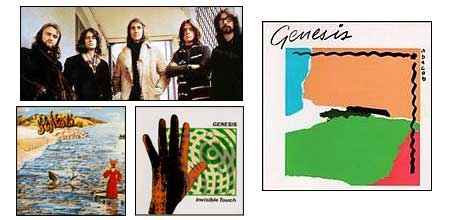Genesis

Synopsis of Pop Music
“And it’s hey babe, your supper’s waiting for you…
Hey, my baby, don’t you know our love is true...”
Its ex-members, Peter Gabriel and Phil Collins among them, are many, and Gabriel’s flower-head masks are long gone…but the legacy of Genesis mightily endures. Lesser bands have unraveled with just the exodus of one drummer, let alone four, and presently, with a Scotsman vocalist (their third) who’s twenty years his bandmates’ junior, the men of Genesis are making music still. So what’s the glue that has kept them together for over thirty years? Is it the public school beginnings? The good, round mix of art rock and pop singles? The biblical moniker—hey, that's stability-inspiring, isn't it?
The first inklings of this long-lasting band were in an English public school in 1965. Fifteen-year-olds Peter Gabriel and Tony Banks played in a group called Garden Wall, while Michael Rutherford and Anthony Phillips played in Anon. But the older members of both bands eventually graduated and disappeared (matriculating boys being matriculating boys)…so the still-schooling Gabriel, Banks, Rutherford, Phillips and drummer Chris Stewart got together and formed New Anon.
Jonathan King, a producer and alumnus of the same school as our boys, heard New Anon’s six-song demo and was impressed enough to finance further recordings. He also came up with the new, epic-sounding name 'Genesis' and got them a one-album record contract with the fledgling Decca Records. That record was a full-fledged flop for the broken-hearted teens, but in 1970, they brushed themselves off and found manager Tony Stratton-Smith, who signed them to his Charisma label.
The spot behind the drum kit, unfortunately, proved to be more revolving door than actual seat. Stewart left and was replaced by John Silver, who was replaced by John Mayhew. Phillips, supposedly plagued by nasty stage fright, left as well. But in late 1970, drummer number four, Phil Collins, plunked down in the hot seat. Collins was no stranger to the spotlight, as a former child actor (who appeared in a crowd scene in the Beatles’ A Hard Day’s Night), and no stranger to music either, as the ex-drummer in a group called Flaming Youth. New guitarist Steve Hackett took the guitar reins.
Though membership had shuffled and re-shuffled, the band’s sound was coming together, as evidenced on their Nursery Cryme release, and the stage act was coming together too—thanks to Gabriel’s crowd and press-pleasing theatrics. This young student of the multi-media arts was increasingly given to using wild masks and theatrical props—partly to accompany the stories that he told before songs (which diverted attention from the other members while they tuned their instruments), and partly to cover up his own uneasiness up on the stage. Unfortunately, even with the popular live status, they weren’t selling loads of records just yet and their label threatened to drop them. But the release of 1972’s Foxtrot and the following year’s Selling England by the Pound proved a resuscitation. And with the marathon “Supper’s Ready,” which was born of the former, the live shows became darn near legendary.
The glow of their early years culminated in The Lamb Lies Down in Broadway, in which Gabriel told the story of Rael, a Puerto Rican punk. It was certainly art rock, endlessly ambitious and esoteric. Following its commercially disappointing release and tour, Gabriel announced he was leaving the band. There were long auditions for a new singer, but everyone agreed that Collins himself, who had sung on tracks prior, was better than any of the candidates. The new line-up, whittled down to four at this point, went back the studio to make Trick of the Tail, and later Wind and Wuthering. Both were smashes.
Of course, Genesis wouldn’t be Genesis without someone leaving, and in 1977, guitarist Hackett did just that. On the aptly-titled 1978 And Then There Were Three, their sound grew softer and less progressive. 1981 saw the release of Abacab, and the middling years of that decade were marked by records like Genesis and Invisible Touch, leading to a string of hit singles that included "That's All," "Invisible Touch" (their first #1), "In Too Deep," "Throwing It All Away," "Land of Confusion" (boasting a puppet-laden satiric video) and "Tonight, Tonight, Tonight." Arenas packed up with fans of both the band’s newer, more mainstream sound and Collins’ successful solo records. Rutherford formed Mike and the Mechanics in the meantime, but would always circle back to Genesis.
A few years after 1991’s We Can’t Dance was released (featuring "I Can't Dance," "No Son of Mine" and "Hold on to My Heart"), Collins left to pursue his solo ventures, as well as music for movies. Ray Wilson from Stiltskin came aboard, and the new formation released Calling All Stations in 1997.
After more than thirty years together (and apart), Genesis has certainly earned the status of elder statesmen of rock. But to label them 'dinosaur' rockers would be an understatement, because the dinosaurs are extinct. Genesis, on the other hand, might be around indefinitely, flower masks or not.
Artist Release History
1969 – Where the Sour Turns to Sweet1969 – From Genesis to Revelation
1969 – And the World Was
1970 – Trespass
1971 – Nursery Cryme
1972 – Foxtrot
1973 – Selling England by the Pound
1973 – Genesis Live
1974 – The Lamb Lies Down on Broadway
1976 – Wind & Wuthering
1976 – Trick of the Tail
1977 – Seconds Out
1978 – And Then There Were Three…
1980 – Duke
1981 – Abacab
1982 – Three Sides Live
1983 – Genesis
1986 – Invisible Touch
1991 – We Can’t Dance
1992 – Genesis Live: The Way We Walk, Volume 1
1993 – Genesis Live: The Way We Walk, Volume 2
1997 – Calling All Stations
Pop Sub Categories
rockEssential Music Albums
The Genesis Archives, Vol. 1: 1967-1975 (Atlantic)Band Members
Peter Gabriel vocalsPhil Collins vocals, drums
Tony Banks keyboards
Mike Rutherford guitars
